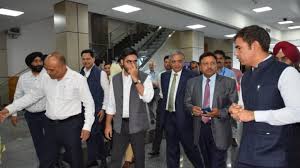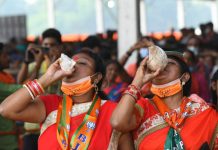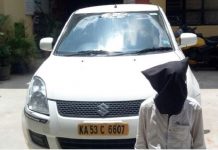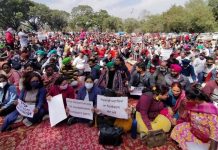Some observers feel that the centre may be reluctant to hold polls in the UT not just because of the renewed militancy in Jammu but also because of the prospect of the elected government asserting itself against the centre’s ongoing policies in the region. A report by Riyaz Wani

Chief Election Commissioner Rajiv Kumar made all the right noises on his visit to Jammu and Kashmir on August 8-9, but the skepticism about the Election Commission of India’s seriousness about holding Assembly polls in the union territory persists.
“Time has come to give the people of J&K its own government through elections. We are committed to conducting elections at the earliest. We are sure that people of J&K will give a befitting response to disruptive forces,” said CEC Rajiv Kumar, who was accompanied by Election Commissioners Gyanesh Kumar and S.S. Sandhu. “No internal or external intervention will be allowed to derail the democratic process. We are all prepared for it.”
On the face of it, this meant that elections are set to be announced in the near term in line with the Supreme Court deadline to hold the exercise in the UT before the September 30 deadline. But people in the UT are keeping their fingers crossed.
This is because both the central and the UT governments have exhibited little urgency to hold Assembly elections. This, despite the fact that the situation has visibly improved in the region. The militancy in Kashmir Valley has progressively reduced over the last five years which is borne out strikingly by the drastic drop in the number of militants and by the disappearance of unrest and stone throwing. And by that yardstick this is the most conducive atmosphere imaginable for a free and fair electoral exercise.
However, over the past some months, parts of Jammu division have witnessed a spurt in militant activity creating a degree of uncertainty about the poll process based on enhanced security threat perception.
In the run up to the ECI visit, the united Opposition recently staged a massive protest in Jammu, demanding restoration of J&K’s statehood with full powers and withdrawal of powers granted to Lieutenant Governor Manoj Sinha.
The protest was staged by All Party United Front (APUF), a Jammu-based alliance of over a dozen opposition political parties and social groups. Senior leaders of Congress, NC, PDP, CPI(M), Shiv Sena (UBT), AAP and Jammu-based parties gathered near the statue of Maharaja Hari Singh at Tawi bridge in the heart of Jammu city and participated in the protest.
National Conference leader and Member of Parliament Ruhullah Mehdi has also called for immediate assembly elections in Jammu and Kashmir, stressing that only one month remains before the Supreme Court’s deadline.
But all fingers remain crossed. Some Kashmir observers argue that the centre may be reluctant to hold polls in the UT not just because of the renewed militancy in Jammu but also because of the prospect of the elected government asserting itself against the centre’s ongoing policies in the region.
“Since 1989, Kashmir has witnessed all its elections during militancy. In 1996, we had runaway militancy, still elections were held,” said a political analyst, who didn’t want to be identified. “Besides, today’s militancy is largely confined to forests and is mostly populated by foreigners, with little to no impact on everyday life in J&K.”
However, in apparent counter to the anticipated assertion of its role by an elected UT government, the central government has already granted more powers to J&K Lieutenant Governor. By increasing the LG’s control over the transfers and postings of all-India service officers like the IAS and IPS, as well as appointments of judicial officers, police, and law and order matters, the central government appears to be paving the way for a more centralized administration ahead of potential elections. The move effectively restricts the new government’s ability to reverse the changes of the past five years, thereby securing New Delhi’s long-term agenda for the region.
The central government has thus apparently nothing to fear and this should normally pave the way for holding Assembly elections in the near future. And this may very well happen. For once, the ECI’s assurances about elections being held on time may actually come true.













